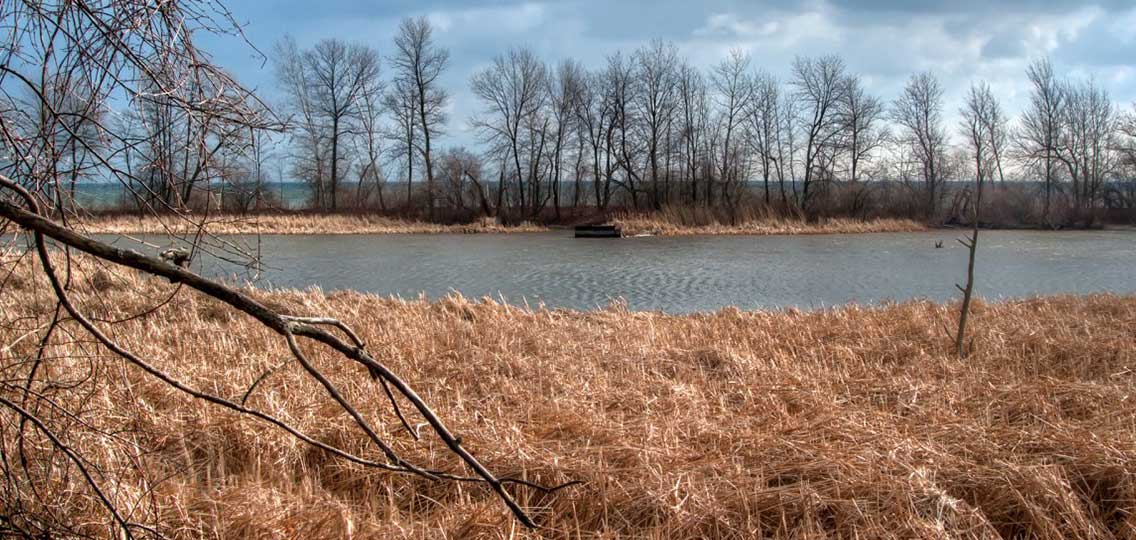Ontario government is trying to run roughshod over its own planning laws
Toronto, Ont./ Traditional territories of several First Nations including the Huron-Wendat, the Anishnaabeg, Haudenosaunee, Chippewas, and the Mississaugas of the Credit First Nation — Environmental groups have applied for a motion to stay to prevent developers from destroying Provincially Significant Wetlands at Lower Duffins Creek in Pickering, Ontario.
Ecojustice, on behalf of Environmental Defence and Ontario Nature, filed the motion to stay with the Ontario Divisional Court following an application from a developer to the Toronto Region Conservation Authority (TRCA) for a permit to begin construction on the wetlands.
On March 4, the Ontario government issued a regulation requiring the TRCA to issue a development permit to Pickering Developments by March 12. In effect, this permit will give the developers permission to destroy a protected, rare coastal Great Lakes wetland. Not only instrumental for water filtration and flood mitigation, the wetland is a critical refuge for wildlife.
Last year, the Ontario Minister of Housing and Municipal Affairs issued a Minister’s Zoning Order (MZO) to allow the construction of a warehouse and distribution facility on the wetlands. Environmental Defence and Ontario Nature, represented by Ecojustice, filed a judicial review against the Ontario government for this unlawful use of an MZO.
The Ontario government has now tabled the Supporting Broadband and Infrastructure Expansion Act (Bill 257) in an attempt to give retroactive cover to their illegal actions.
On March 5, the environmental groups filed an urgent motion to prevent the TRCA from allowing the developer to destroy this Provincially Significant Wetland.
Even as the Ontario government appears determined to ram through development on Duffins Creek, the project faces strong opposition from local communities, who value its ecological and cultural benefits, and from the TRCA’s Board of Directors.
Laura Bowman, Ecojustice lawyer said:
“This case is crucial to ensuring limits to MZOs across Ontario. If the government is allowed to ignore protections for important coastal wetlands at Duffins Creek this threatens the environment and good planning across Ontario.
“The Ontario government has ignored its own planning laws by approving this development. The legality of the zoning authorization should be tested before the wetland is destroyed forever. This is why our clients have applied for an urgent motion to stay the work on the site.”
Tim Gray, executive director, Environmental Defence said:
“It is a sad day when we have to go to court to force our own government to obey Ontario law. It is even more shocking when the government seeks to gut those same laws to avoid being held accountable in court.”
“Lower Duffins Creek wetland is rare, precious and valued. Its destruction would be a disaster on its own but its loss would also signal that all wetlands, forests, and river valleys are beyond the protection of the law and at risk from rapacious developers.”
Caroline Schultz, executive director, Ontario Nature said:
“There’s an insidious and accelerating pattern of undercutting environmental rules to facilitate reckless development projects in Ontario. These are done against the will of communities and against the long-term interest of Ontarians. As we grapple with the dual crises of climate change and biodiversity loss, it’s unconscionable to drain the Duffins Creek Wetland Complex.”
About:
Ecojustice uses the power of the law to defend nature, combat climate change, and fight for a healthy environment. Its strategic, public interest lawsuits and advocacy lead to precedent-setting court decisions and law and policy that deliver lasting solutions to Canada’s most urgent environmental problems. As Canada’s largest environmental law charity, Ecojustice operates offices in Vancouver, Calgary, Toronto, Ottawa, and Halifax.
Environmental Defence is a leading Canadian environmental advocacy organization that works with government, industry and individuals to defend clean water, a safe climate and healthy communities.
Ontario Nature protects wild species and wild spaces through conservation, education and public engagement. Ontario Nature is a charitable organization representing more than 30,000 members and supporters, and more than 150 member groups across Ontario.

